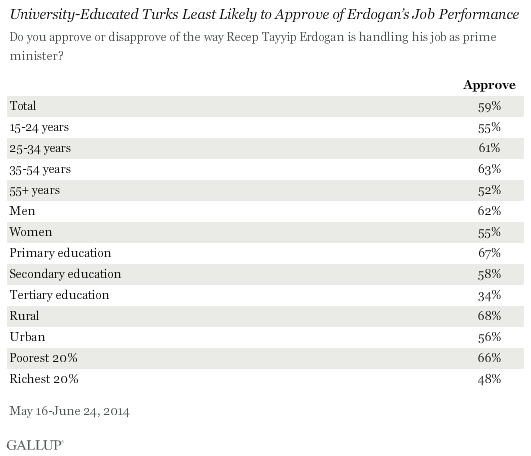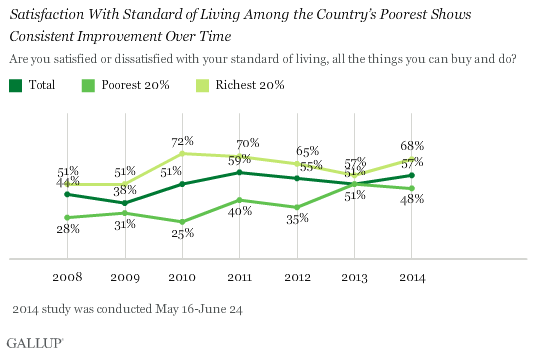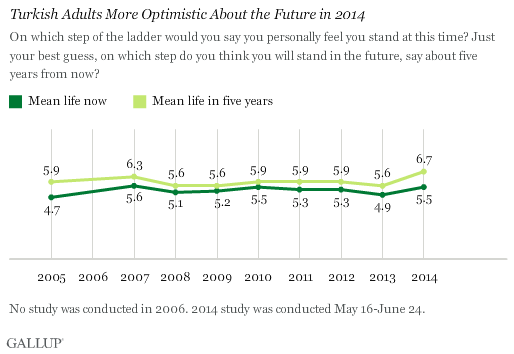WASHINGTON, D.C. -- About six in 10 Turkish adults (59%) interviewed in May and June approved of the way current Prime Minister Recep Tayyip Erdogan -- the front-runner in Sunday's presidential election -- is handling his job. Majorities in nearly all major sociodemographic groups are satisfied with Erdogan's job performance -- with the exception of university graduates (34%) and the wealthiest Turks (48%). The prime minister's approval rating rises to about two-thirds among Turks with the lowest household incomes (66%) and among residents of rural areas (68%).

Poorest Turks Increasingly Satisfied With Standard of Living
Many poor Turks have seen improvements in their living standards under Erdogan's watch, a likely factor in his high popularity among this group. While living standards in Turkey have generally improved since 2008 thanks to a quick recovery after the global economic crisis, the poorest 20% of Turks are particularly likely to have grown more satisfied with their living standards -- possibly related to considerable spending on social assistance programs under Erdogan's AKP government. In 2008, 28% of the poorest Turks were satisfied with their standard of living, rising to 48% in 2014.

Turks' Life Evaluations on the Upswing
Overall, Turks' life evaluations have improved significantly compared with previous years. In fact, Turks are now more optimistic about their future than at any time since the global economic crisis. In May through June 2014, Turks rated their current lives an average of 5.5 on a scale of 0 to 10, while they rated their future lives an average of 6.7. In May 2013, during the height of the Gezi Park protests, life evaluations were considerably lower (4.9 and 5.6, respectively). This improvement can be seen across all sociodemographic groups.

Bottom Line
Despite heavy criticism from the Turkish opposition and international leaders of the AKP government's handling of the Gezi Park protests, in addition to allegations of high-level official corruption, a clear majority of Turks approve of Erdogan's job performance as prime minister. Approval ratings are especially high among the country's poorer residents, who report steady improvements in their standard of living under Erdogan's leadership. And with life evaluations improving among all sociodemographic groups after last year's protests rocked the country and sent stock prices tumbling, Erdogan will likely be hard to beat at the polls this Sunday.
For complete data sets or custom research from the more than 150 countries Gallup continually surveys, please contact us.
Survey Methods
Results are based on interviews with approximately 1,000 adults, aged 15 and older, conducted in July 2008, November 2009, July 2010, May 2011, March 2012, June 2012, May-June 2013 and May-June 2014. The two surveys from 2012 were combined into a single measurement. The 2014 survey was conducted May 16-June 24, 2014, and was the first study to be conducted by telephone (landline and mobile phones). All previous studies were conducted face-to-face. For results based on the total sample of national adults, one can say with 95% confidence that the margin of sampling error is ±3.7 percentage points for the 2014 data. The margin of error reflects the influence of data weighting. In addition to sampling error, question wording and practical difficulties in conducting surveys can introduce error or bias into the findings of public opinion polls.
For more complete methodology and specific survey dates, please review Gallup's Country Data Set details.
